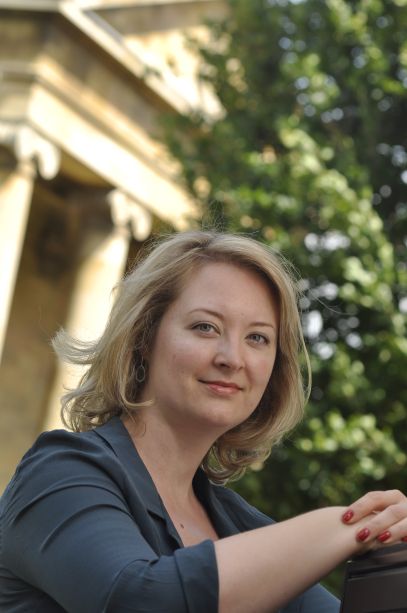
BA (Melbourne), LLB (Melbourne), PhD, FHEA
Sarah Kennedy is the RJ Owens Fellow in English and a College Associate Professor. She completed her BA (Hons.) and LLB (Hons.) at the University of Melbourne, Australia. She worked as a commercial solicitor specialising in competition litigation before commencing her academic career. She was a recipient of the Rae and Edith Bennett Travelling Scholarship, which funded her PhD research at St John's College, Cambridge. She was a Junior Research Fellow at Downing College, Cambridge, 2013–2017.
She has given lectures and talks in the UK, US, Australia, and Italy, and has appeared on Sky Arts speaking about the poetry of T. S. Eliot. In 2016 she delivered the Annual T. S. Eliot Lecture, on ‘Eliot’s Ghost Women’, at Newnham College, Cambridge. In 2017 she was a Visiting Fellow at Pomona College, Claremont, California.
Sarah’s research interests fall within twentieth-century and contemporary Anglophone poetry, film, and fiction. They include early and high modernism, metaphor, close reading, creativity and the ethics of attention, narrative in film and prose fiction, nature-writing, vibrant materialism, and ecopoetics, the pelagic imaginary, the energy unconscious, trauma, literary motherhood, the uncanny, literary self-conception, originality, and allusion. She is especially intrigued by questions of poetic influence, creative inheritance, and the literary afterlives of poets. She is also interested in the postcolonial literatures of the Pacific, including Aotearoa/new Zealand and Australia, and in trans-regional encounters between these literatures and modernist diasporas.
Her 2018 book T. S. Eliot and the Dynamic Imagination (Cambridge University Press) on metaphor and the imagination in the work of T. S. Eliot follows in the tradition of histories of the Romantic and Victorian poetics of originality, but focuses on the twentieth-century legacy of those histories and their interrelation with parallel fields of knowledge. It charts the relations between metaphor and creativity in Eliot's poetry and criticism through their affinities with discursive developments in 'new physics', optics, colour theory, psychology, and anthropology.
In addition to her work on Eliot she has published essays on the poets Elizabeth Bishop, Judith Wright, and Alice Oswald, the sculptors Barbara Hepworth, and Elisabeth Frink, and the film-maker Woody Allen. Her essay on Eliot and Wallace Stevens won the John Serio Award in 2019.
She is currently writing a contemporary novel as well as working on a revisionist close reading primer called The Shadow on the Page: A Field Guide to Close Reading. This project seeks to answer the need for a holistic yet accessible orientation into the practices of literary close reading on the page and in the world.
A further project is tentatively titled The Self Made Strange: Landscape and Self-Estrangement in Postwar Lyric Poetry. This study explores metaphors of place as the key to the processes of transmission and assimilation (as well as the vertical pressure of literary influence) that generate creative and ethical tensions within the lyrical selfhood of a collection of exemplary mid-century poets.
Sarah teaches for Practical Criticism and Critical Practice across all three years and 7b (English Literature and its Contexts 1870-the present) at Part I, and supervises dissertations across a range of papers. She has taught at university level for over a decade and is a Fellow of the Higher Education Academy (UK). In 2020 Sarah was a finalist in the CUSU Student-Led Teaching Awards. At graduate level, Sarah teaches within the MPhil in Multi-disciplinary Gender Studies offered by the Centre for Gender Studies. She is a visiting lecturer and seminar leader with the T. S. Eliot International Summer School.
Books
T.S. Eliot and the Dynamic Imagination (Cambridge University Press, 2018).
Book Chapters
Kennedy, Sarah. ‘The Earlier Twentieth Century’, in The Cambridge Companion to Devotional Poetry, ed. Helen Wilcox and Mark Oakley (Cambridge University Press, 2025), forthcoming
Kennedy, Sarah. ‘Judith Wright’, in The Cambridge History of Australian Poetry, ed. Ann Vickery and Philip Mead (Cambridge University Press, 2024), forthcoming
Kennedy, Sarah. ‘The Mechanical Bride: On Not-Knowing in and after Annie Hall’, in Remembering Annie Hall, ed. Ana María Sánchez-Arce and Jonathan Ellis (Bloomsbury, 2023)
Kennedy, Sarah. ‘Florida’, in Elizabeth Bishop in Context, ed. Angus Cleghorn and Jonathan Ellis (Cambridge University Press, 2021)
Kennedy, Sarah. ‘Elizabeth Bishop’s Fugitive Empathy’, in Reading Elizabeth Bishop: An Edinburgh Companion, ed. Jonathan Ellis (Edinburgh: Edinburgh University Press, 2019)
Kennedy, Sarah. ‘Sea, Sky, Earth, and Spirit: The Aegean Suite (1971)’, in Divided Circle: Barbara Hepworth (Heong Gallery, Downing College, Cambridge), 2019
Kennedy, Sarah. ‘Elisabeth Frink: Sculptor of living forms’ in Larger than Life: Dame Elisabeth Frink (Heong Gallery, Downing College, Cambridge), November 2017
Kennedy, Sarah. ‘Let these words answer: Ash-Wednesday and the Ariel Poems’, in The New Cambridge Companion to T. S. Eliot, ed. Jason Harding (Cambridge: CUP, 2016)
Articles
Kennedy, Sarah. ‘Eliot Among the Rag-Pickers: Waste, Hope and the Ecocritical Imagination in The Waste Land,’ in T. S. Eliot Studies Annual, 5 (2023), 109-135
Kennedy, Sarah. ‘the water is in my thinking now’: Alice Oswald, poikilomēsis and classical presences’, The Yearbook of English Studies, 51 (2021), 139–61
Kennedy, Sarah. ‘“We reason of these things with later reason”: Plain sense and the poetics of relief in Eliot and Stevens’, Wallace Stevens Journal, Vol 42, Number 1 (Spring 2018): 99–116.
Kennedy, Sarah. ‘“Where’s home, Ulysses?” Judith Wright in Europe 1937’, Journal of Commonwealth Literature, 52.2 (August 2015), 331–349
Kennedy, Sarah. ‘The “unknown, remembered gate”: Four Quartets as spiritual biography’, Literature & Aesthetics 18.1 (June 2008), 84-97
